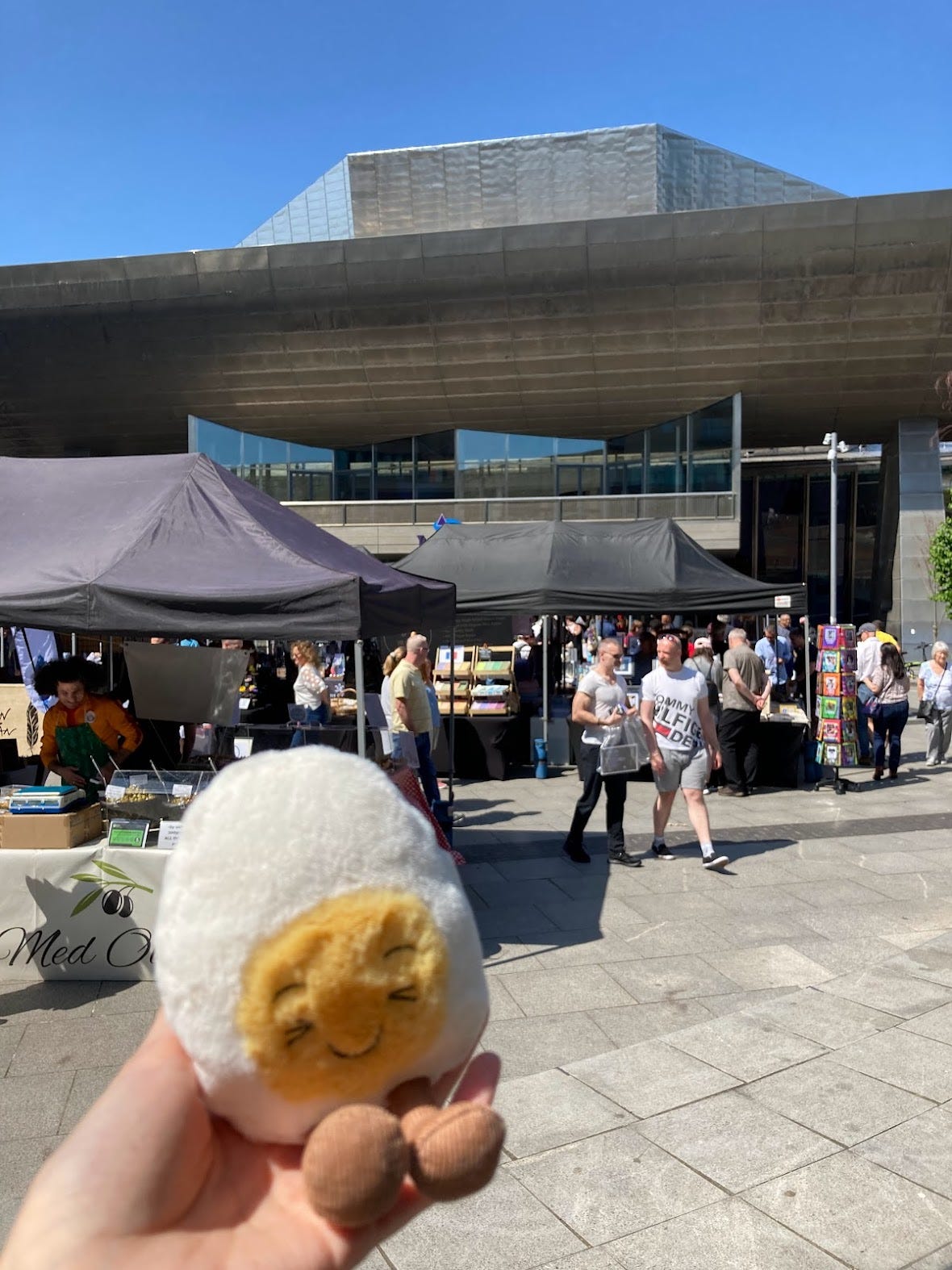Hello friends 🤗
With the nice weather plus a bank holiday Monday (which I will use to finish writing my book review) I have taken it easy this weekend and truly not done any work! Look at me with my work-life balance.
Anyway, here is a rundown of my week plus a bit of a ramble about how disability is portrayed in Grey’s Anatomy.
📆 Activities 🛼
Monday, 22 May. Finished first full draft of my emotions and disability conference paper 💚
Wednesday, 24 May. Meeting with Neil about the workshop
Thursday, 25 May. First meeting with PGR Advisor (finally!)
Friday, 26 May. ☀️
AM-PM. Co-working with A & L from Media City all day
PM. Seminar: ‘Experience, institutional culture, and the politics of space: Environments of childbirth in Britain’s National Health Service since 1970’
Saturday, 27 May.
AM. Makers Market next to the Lowry
PM. Friend’s birthday party (book-themed!)🥳

🩻Ablelism in Greys Anatomy🚑
We all have our guilty pleasures. For the past month or so, mine has been rewatching Grey’s Anatomy. I don’t know whether I noticed the first time round, as a teenager, but watching it now the pervasive ableism is glaring. Sure, there’s the usual stuff you get in medical dramas: the language of ‘fixing’, and an emphasis making people look ‘normal’ or ‘curing’ deafness. There are questionable ethics and inaccurate representations, but also stuff that I think would give most people a ‘WTF’ reaction.
But the characters also just say outright horrific things that are never challenged. Throw-away lines that are based on the assumption that we, the audience, agree with their worldviews. In season 10 (which I am watching now), Callie says she doesn’t want to be responsible for turning an olympic snowboarder into a “doorstop” - referring to the risk of double amputation.
Here’s another example. In an earlier season, the Chief of surgery ended up listing a whole bunch of things that were going wrong in the hospital to illustrate how it was falling apart: their attendings were quitting, they lost their status as a trauma centre, they didn’t have the best residency programme any more, and (of course) they had an Aspergers head of cardio. As a side note, I am pretty sure the autistic surgeon (in they say Aspergers but it was filmed a while ago so they get a pass for that one) was only in there to make fun of and she didn’t stay long.
Regarding disability representations, it’s not all bad. When Arizona had her leg amputated, they made references to her prosthesis pinching her residual limb and she had phantom pain for an episode or two. I guess this is better than saying nothing about the continual adjustment and re-adjustment involved in living with a prosthetic limb. They also comment on her needing a seperate leg in order to wear high heels, which she magically gets within a couple of episodes. I know that these are supposed to be US surgeons so perhaps the cost wouldn’t have been an issue. But getting a new, perfectly-fitting limb so quickly and being able to use it right away? Though I suppose the show isn’t just about Arizona and the writers make decisions about which storylines to focus on. On a positive note, when April’s sisters visit in season 10 and tell Arizona about a three-legged dog who they find so inspiring, it is their ignorance that is the punchline.
Anyway, I am sure other people have written about it much more eloquently and comprehensively than me. It is interesting to think about how I responded to these kinds of media representations prior to becoming involved in disability. I honestly don’t remember whether I even picked up on some or any of these things the first time round. Which makes me wonder whether there are people watching now who don’t see a problem with it. Perhaps I will make a list of other specific examples as I continue to re-watch, or find one that somebody else has already made…
I’m not sure what the purpose of this rant/commentary has been. Maybe there doesn’t need to be one. After all, this is my newsletter and I can do with it what I want.
🎙Drafting the Past 🎧
I’ve recently started listening to a podcast called ‘Drafting the Past’. Each episode, the creator interviews a historian about their approach to writing history. In it, they talk about their recent work, sharing their process, philosophies and advice. I have really been enjoying listening to it on my way into work or coming home (that is, when I am not reading my kindle). I should probably start noting down the suggestions I think will help me so I don’t forget. Here are a couple off the top of my head.
Reverse outlining. Once you have finished your first draft, create an outline for the piece. This should help give you clarity on what the purpose and focus of each paragraph and chapter is on, and how these all come together to form the overall argument which can sometimes get lost in the process of actually writing.
For developing your dissertation into a book or other format - rearrange the content in as many different ways as you can think of.
🧩 Entertainment 📺
📘 Read The Three Loves of Sebastian Cooper. Very intergenerational. So many character names that I could not remember who was who, but I really got into it towards the end. ⭐️⭐️⭐️ (3.5 stars)
📘 Started reading Woman Last Seen in her Thirties by Camille Pagan.
🧩 Still working on my Minions in New York jigsaw (perhaps forever)
📺 Continuing to watch Grey’s Anatomy and Working Moms
📺 Watched the currently-released episodes of The Ultimatum: Queer Love




